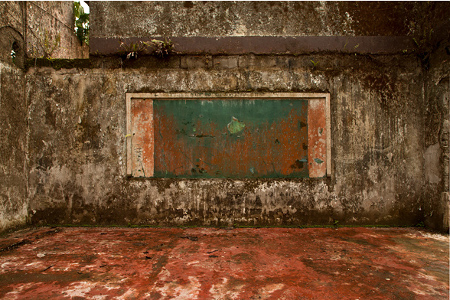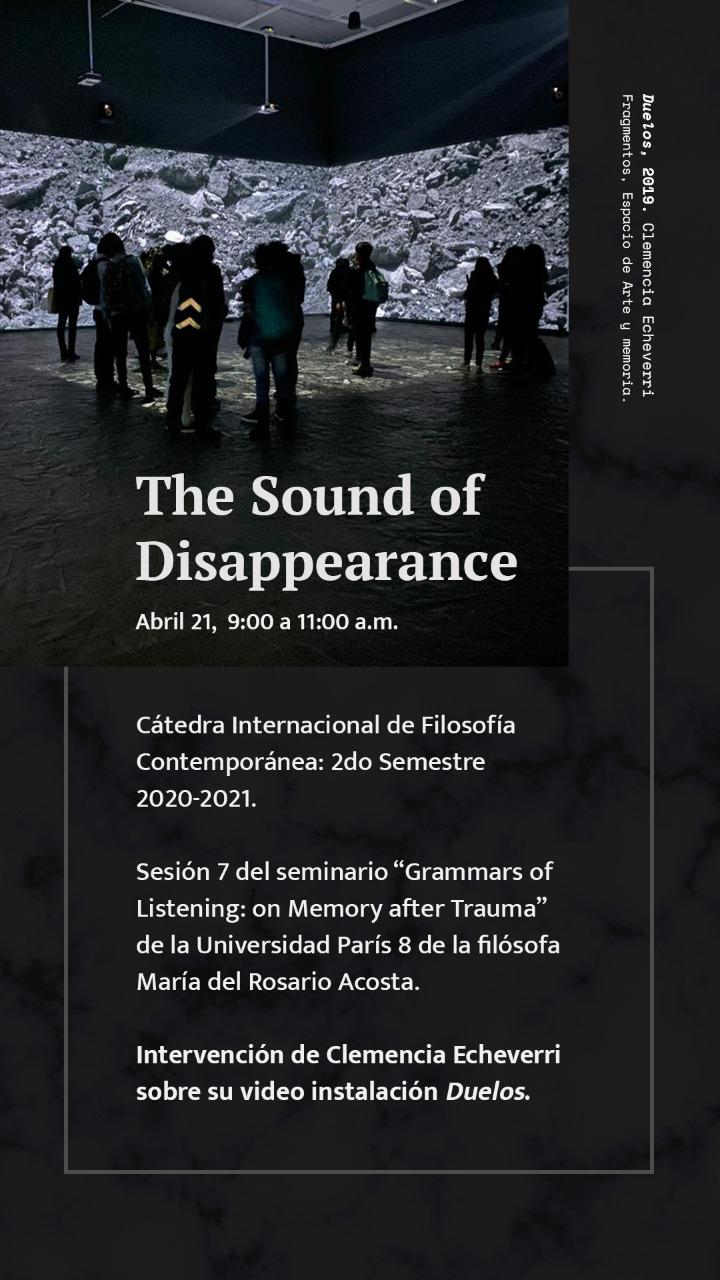Chaire internationale de philosophie contemporaine. María del Rosario Acosta López (Université de Californie à Riverside) : Grammars of Listening : On Memory After Trauma. 10.03-12.04.2021
Ouverture de la Chaire internationale de philosophie contemporaine de l’Université Paris 8
María del Rosario Acosta López
PR, Département d’études hispaniques, Université de Californie à Riverside
PR, Departement of Hispanic Studies, University of California, Riverside
De l’esthétique comme critique aux grammaires de l’écoute :
reconfigurer la sensibilité comme tâche politique
From Aesthetics as Critique to Grammars of Listening :
On Reconfiguring Sensibility as a Political Task
Rejoindre la réunion Zoom / Join Zoom Meeting
https://zoom.us/j/98839171696?pwd=SHBxdGVaOXpMUDdwaEhhTkRHV3ZDZz09
ID de réunion / Meeting ID : 988 3917 1696 | Mot de passe / Passcode : PHILO
10 Mars - 12 Mai 2021 / March 10 - May 12, 2021
2 Avril - 6 Juin 2021 / April 2 - June 6, 2021
Ses publications les plus récentes sont consacrées à l’esthétique de F. Schiller, l’esthétique de la résistance dans l’art latino-américain, les perspectives décoloniales sur la mémoire et l’histoire ainsi que sur l’injustice et la violence épistémiques. Elle travaille actuellement à la révision finale de son prochain livre, Gramáticas de lo inaudito : pensar la memoria después del trauma (Herder, 2022), et à l’édition de deux livres à paraître, l’un en espagnol sur la communauté chez Hegel, Nancy, Esposito et Agamben (Narrativas de la comunidad : de Hegel a los pensadores impolíticos), un autre en anglais, The Unstoppable Murmur of Being-Together, co-écrit avec Jean-Luc Nancy et le Groupe sur le droit et la violence. Un livre sur le projet politico-esthétique de Schiller, provisoirement intitulé Aesthetics as Critique, est également en préparation.
Wed. 4:00-6:00 pm. 8 sessions : March 10 - May 12 2021 (break on April 28 and May 5)

https://grammarsoflistening.wordpress.com

Visit of Clemencia Echeverri, at the 7th session on April 21 2021
Site Internet de l’artiste / Website of the artist
Toutes les lectures seront téléchargées en ligne sur un google drive. Pour y accéder et vous inscrire à la liste de diffusion du séminaire, veuillez envoyer votre nom, votre affiliation institutionnelle (le cas échéant) et une brève description de vos intérêts à acostaparisviiiseminars@gmail.com.
All the readings will be uploaded online in a google drive. To access the drive and subscribe to the seminar’s email list please send your name, institutional affiliation (if any) and short description of your interests to acostaparisviiiseminars@gmail.com.
Lectures/séances / Readings/sessions :
Session 1 (March 10) : From Aesthetics as Critique to Grammars of Listening : On Reconfiguring Sensibility as a Political Task (introduction to both seminars)
Session 2 (March 17) : Trauma and the Breakdown of all Grammar
Main reading : Freud, S. “Beyond the Pleasure Principle,” in The Standard Edition of the Works of Sigmund Freud, vol. 18 (London : Hogarth, 1953), sections I-IV, pp. 7-33. Recommended : Caruth, C. Unclaimed Experience : Trauma, Narrative and History (Baltimore : John Hopkins University Press, 1996), Introduction and Conclusions ; Caruth, C. Literature in the Ashes of History (Baltimore : John Hopkins University Press, 2013), Chapter 1. Other : Berlant, L. Cruel Optimism (Durham, NC : Duke University Press, 2011), Chapter 2 ; LaCapra, D. “Traumatropisms”. History and its Limits. Human, Animal, Violence (Ithaca : Cornell University Press, 2009), 59- 89 ; Pe ?rez, J.D. “Hacia una (re)vocalizacio ?n del trauma : una cri ?tica a Caruth desde la e ?tica de la escucha,” Peri ?frasis 9:18 (2018) : 117-133 ; Rottenberg, E. “Freud’s Other Legacy”, Parrhesia 21 (2014) : 13-22.
Session 3 (March 24) : Storytelling and Grammars of Silence
Main reading : Benjamin, W. “The Storyteller”, Illuminations : Essays and Reflections (NY : Schocken, 1969) : 83- 110. Recommended : Oyarzun, P., “Narration and Justice,” in Doing justice : Three essays on Walter Benjamin (Polity Press, 2020), 75-107 ; Wynter, S. “Novel and History, Plot and Plantation,” Savacou, no. 5 (June 1971) : 95-102. Other : Castillejo-Cuellar, A. “La localizacion del dano : Etnografia, espacio y confesion en el escenario transicional colombiano,” Horizontes Antropologicos 20:42 (2014) : 213-236, Acosta Lopez, M.R. “La narracion y la memoria de lo inolvidable. Un comentario al ensayo “El narrador” de Walter Benjamin,” in Andrade, M. (ed.), Walter Benjamin, aqui y ahora (Bogota : Universidad de los Andes, 2018), 175-196.
Session 4 (March 31) : Grammars of Listening and the Task of Imagination
Main readings : Arendt H. Origins of Totalitarianism, Chapter 12 and 13 (Harcourt, 1973) : 389-480 ; Arendt, H. “Understanding and Politics”. Essays in Understanding (Schocken : New York, 2004), 307-327. Recommended : Sharpe, C. In the Wake (Duke University Press, 2016), Chapters 1 and 4 ; Acosta Lo ?pez, M.R. “Totalitarianism as Structural Violence : Towards New Grammars of Listening,” in O’Byrne, A. and Shuster, M. Logics of Genocide : The Structures ofViolence and the Contemporary World (London/NY : Routledge, 2020) : 173-186.
Session 5 (April 7) : On Political Violence and the Colonization of Listening
Main readings : Cavarero, A. “The Vocal Body,” Qui parle, 21(1) (2012) : 71-83 ; Cavarero, A. Horrorism : Naming Contemporary Violence (NY : Columbia UP, 2009) (selections TBA) ; Dorfman, A. Death and the Maiden (New York : Penguin Books, 1991). Recommended : Cavarero, A. Relating Narratives. Storytelling and Selfhood (NY : Routledge, 2000) (selection TBA) ; Fanon, Franz Black Skin, White Masks, trans. Richard Philcox (New York : Grove Press, 2008, Chapter 5 ; Vallega, A. “Displacements—Beyond the Coloniality of Images”, Research in Phenomenology 41 (2011) 206–227 Other : Acosta Lo ?pez, M.R. “Perder la voz propia : de una fenomenologi ?a feminista de la voz a una aproximacio ?n a la violencia poli ?tica desde la escucha,” commisioned for Luciana Cadahia and Ana Carrasco Conde, Fuera de si ? mismas. Motivos para dislocarse (Madrid, Herder, 2020) : 121-156.
Session 6 (April 14) : Listening to the Erasures of History
Main readings : Garcia Marquez, G. One Hundred Years of Solitude (selected fragment). Recommended : Acosta Lopez, M.R. “One Hundred Years of Forgotteness : Aesth-Ethics of Memory in Latin America,” Philosophical Readings, Special Issue on Philosophy in Colombia, XI:3 (2019) 163-17. Other : Acosta Lopez, M.R. “La Resistencia de lo inarchivable : del mito a la historia en Musa Paradisiaca de Jose Alejandro Restrepo,” in Dialogo : a Journal for Latin American Studies 22:2 (2019) 35-48 ; Caruth, C. Literature in the Ashes of History (Baltimore : John Hopkins University Press, 2013), Chapter 5 ; Mendoza, A and Thomas, T. “Literary and Visual Rememory at the 90th Anniversary of the Banana Massacre in Colombia” (cf. https://zapruderworld.org/volume-5/literary-and-visual-rememory-at-the-90th-anniversary-of-the-banana-massacre-in-colombia/) ; Uribe, A. “¿Pueden los hechos historicos resistirse a la mendacidad ? Sobre la matanza de las bananeras,” Revista Co-herencia 7:13 (2010), 43-67.
Session 7 (April 21) : The Sound of Disappearance
With the presence and intervention of Clemencia Echeverri, artist.
For this session and in preparation for Clemencia Echeverri’s visit to class, please have a look at her work Duelos (available here), as well as Professor Acosta’s interview with her (available with English subtitles here).
Main readings : J.D. Pe ?rez, “Sonorous Rubble, Mourning Affect,” in Echeverri, C. Duelos (Museo Nacional y Ministerio de Cultura, 2019) 66-79 ; Acosta Lo ?pez, M.R. “Art as Resistance to Erasure : on Fragmentos by Doris Salcedo and Duelos by Clemencia Echeverri”, in Lina Britto and Ricardo Lo ?pez-Pedreros, Colombia Revisited (2 vols) (NY : Routledge, forthcoming). Recommended : Chirolla, G. “The Politics of the Scream in a Threnody,” in Zepke, S. and Sullivan, S. (eds.) Deleuze and Contemporary Art (Edinburgh University Press, 2010), 15-33 ; Uribe, M.V. “Against Violence and Oblivion : The Case of Colombia’s Disappeared,” in Polit Duen ?as, G. and Rueda, G. (eds.) Meanings of Violence in Contemporary Latin America (Palgrave) : 38-52 Other : Bargu, B. “Sovereignty as Erasure. Rethinking Enforced Disappearances,” Qui Parle : Critical Humanities and Social Sciences 23 : 1 (2014) : 35-75.
NOTE : this session could be moved to the last session and session 8 would become the 7th. Follow announcements in the worldpress blog for an update later during the semester.
Session 8 (May 12) : Decolonizing Grammars, Decolonizing Memory — Session postponed to a date to be announced in june.
Encina, P. Hamaca Paraguaya (film). Recommended : Acosta Lo ?pez, M.R. “Hamaca Paraguaya de Paz Encina (notas sobre la resistencia de la memoria)” ; N. Brizuela, “A Sense of Place : Paz Encina’s Radical Poetics”, Film Quarterly 70 : 4 (2017) 49-64 Other : Acosta Lo ?pez, M.R. “Grama ?ticas de lo inaudito as Decolonial Grammars : Notes for a Decolonization of Memory,” in Alejandro Vallega (ed.) Philosophy and Liberation in Latin America, a Primary Source Reader (London : Bloomsbury, forthcoming) ; S. Rivera Cusicanqui, “Palabras ma ?gicas : reflexiones sobre la crisis presente” y “Oralidad, mirada y memoria del cuerpo en los Andes”, Un mundo ch’ixi es posible (Buenos Aires : Tinta limo ?n, 2018) 93-134 ; Roci ?o Zambrana, “Vida po ?stuma” https://www.80grados.net/vida-postuma/




